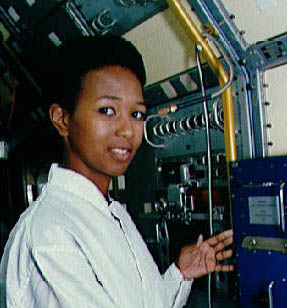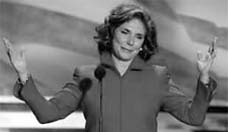
Mae Jemison says "Sometimes we can talk so much about roadblocks and impediments and racism and sexism that people start to bow down to it, much more than if you just mention it peripherally and you know it's there but we don't obsess on it. As you start telling that to children they start worrying that maybe they really can't make it."
Former astronaut Mae Jemison shares her philosophy on education, technology and achieving success.
by Paula Lipp
One would think that going down in the record books as the first African-American woman in space would be enough for Dr. Mae C. Jemison. It doesn't take long in talking to her to realize that's far from the case. Although it is an accomplishment of which she is immensely proud, she downplays the event as the defining achievement of her life.
In fact, despite all her accolades—Essence Award recipient, 1988; induction into the National Women's Hall of Fame, 1993; and namesake of the Mae C. Jemison Academy, an alternative public school in Detroit, just to name a few—Jemison continues to shoot for the stars. At various times a chemical engineer, astronaut, physician and teacher, Jemison now directs The Jemison Group, a consulting firm in Houston specializing in helping to improve life, especially in developing nations, through technology.
As far as she has risen from her humble beginnings in Decatur, Ala., Jemison cites her parents as her most important role models. "When I would ask a question, they would say, 'Go look it up,' or 'How do you think it works?' So I never questioned whether I had the ability to do the things that I was interested in," she remembers.
What is the one achievement of which you are most proud?
MJ: I don't say there's one thing that I'm most proud of. Most of the things that I'm very enthusiastic about are small things that wouldn't resonate with other folks. The most difficult challenges we face are those that we impose upon ourselves, not monumental things that the public sees, but studying or meeting a deadline. For me, I didn't like heights when I was growing up, so getting over my extreme dislike of heights was very important for me, not just because of the astronaut program. That's something that people don't see. It isn't measured as a career accomplishment.
Accomplishing small tasks everyday allows you to accomplish larger, seemingly daunting tasks in the future. I think the most important thing is not that you go down in a record book, but how you feel about yourself. People can always take records away from you; they can be broken. We should be able to say, "I feel good about what I did with my time."
Did you set out while you were in college to accomplish all that you have?
MJ: Each one of us has ideas about what we want to accomplish in life. My biggest goal has always been to enjoy what I'm doing and that doesn't mean that I'm having a party, but that it maintains my attention and that I have passion for what I'm doing.
I've wanted to go into space since I was a little girl and it didn't mean being an astronaut. It may sound like semantics, but I used to laugh and say, "If E.T. lands in my back yard, I'm going up." I always wanted to travel in space. I always wanted to be in space exploration so, yes, I set out doing some things to help make that happen but it wasn't the only thing I wanted to do in life. I was interested in working with the social sciences and with developing countries and I always had an interest in travel, in other cultures and people while I was growing up. While I was at Stanford I majored in African studies as well as chemical engineering and that made me even more aware of different points of view about the world.
I wanted to be involved in space exploration, absolutely. I also wanted to be one of those scientists who's involved with society and who is aware of what our technologies mean to the world and what the world means to technological development, because it's not a one-way street.
So you didn't set out to be the first African-American woman in space?
MJ: In fact, I'm very sorry that I am. When I was growing up, there's no way that I would have imagined that women wouldn't have gone up into space until 1984 with Sally Ride. It's ridiculous as far as my conception of what the world should be like. When I was a little girl, I couldn't understand—nor can anyone explain to me now, beyond the political and cultural reasons—why women weren't part of the astronaut program from the very beginning. I'm not the first woman of color to have the skills, the talent or the desire to be involved.
There must have been times in your career when you encountered sexism or racism. How did you deal with this?
MJ: Of course I did! The biggest point is to recognize them for what they are. When you run into barriers, first of all look inside yourself to see if there is something you can do. Then move beyond that. Let it be their problem. Of course that problem is going to influence you and it's not necessarily going to be easy. We all want folks to believe in us. It's difficult as a student if a professor doesn't believe in you and I think we all face that difficulty, whether we're minority students or women students or white males.
That's where it's so important to be inside of yourself. It's nice to have kudos and appreciation, but unless you can look inside yourself and appreciate yourself when people start to take those rewards from you, you won't be able to move on.
Did any of those hurdles ever prevent you from achieving a goal?
MJ: I don't know, because my point of view is, if I want to do something, I'm going to do it. I may have to figure out a way around it or through it. That's also where flexibility comes into play. Maybe I can't achieve something right now, but I still keep it in mind and I'm going to get it later.
I haven't really dwelled on things much because to hang around back there with that disappointment is to carry it forward with you everyday. It's not that you forget the lessons, but to hang out with them and bring them up at a moment's notice takes away some of the enjoyment of your present time as well as what you look forward to in the future. Don't wallow in [the past], but don't forget it. You see patterns, you see things that happened and you put them in your tool kit. I remember when I didn't get as warm a reception in the physical sciences as I did in the social sciences. I was an undergraduate student and one of the things I did was to spend a lot of time in the social sciences. I didn't stop doing the physical sciences, but I was able to get a balance. I did a lot of dance, for example, and that would give me energy and enthusiasm that I would have to bring to some of my classes where my professors weren't as thrilled to see me.
What are some of your current goals?
MJ: I work on how different technologies can be designed and implemented with the issues of sustainable development in mind, [which] I define as the ability to increase human quality of life now in such a way that it does not compromise future generations' quality of life. You have to take into account individual and societal aspirations and how they interplay not only with our ecosystem and our resources and technologies, but how they influence what technologies we decide to design and build. You may have an understanding of nuclear physics, for example, but it's our choice as a society whether we decide to use that understanding for nuclear bombs, nuclear power plants or nuclear medicine.
Is that the main focus of The Jemison Group?
MJ: I left NASA because I'm very interested in how social sciences interact with technologies. [The Jemison Group] helps other companies design technologies taking into consideration social science issues. People always think of technology as something having silicon in it. But a pencil is technology. Any language is technology. Technology is a tool we use to accomplish a particular task and when one talks about appropriate technology in developing countries, appropriate may mean anything from fire to solar electricity. You have to stand back and take a look at what it is you're trying to accomplish, what aspirations you have and how they are going to interact with the ecosystem, the resources that are available, the technologies that are there and the understanding that we have.
Much of today's technological research is being done in the aerospace field. You've said previously that the Third World stands to benefit the most from that research. What's standing in the way of those countries applying existing technologies now?
MJ: I think a lot of it has to do with perception. People see space technologies and the space shuttle, maybe the Mars Rover, and there's very little correlation to what that means for us here on Earth. That perception—that it's very expensive and has no effect here on Earth—is the problem. Even when people are talking about telephone calls over satellite, there's something that doesn't connect the satellite with being in space. The only time that we highlight space exploration is when there's a problem, like on the Mir spacecraft. When we send a probe to Venus somehow it doesn't correlate that that probe was build by a company here in the United States or elsewhere and the money wasn't spent with the Venetians. It was spent here in the U.S.
Then there's the other part of the perception that developing Third World countries are supposed to be using the oldest, most time-worn technologies. What sense does it make putting in a fossil fuel-based infrastructure for energy delivery when we know that that's going to be an issue in the future with global warming and greenhouse gases? We know it's even going to be an issue with how long the fossil fuels are going to be available. You're sitting on the equator with lots of sunshine—doesn't it make more sense to start looking at solar energy?
The same things start coming up when you're talking about telecommunications. You can leapfrog over old technologies and institute things that are newer, that are on the cutting edge and have greater benefit, both in sustainability and ease of application.
Did last summer's Mars exploration help to bridge the perception gap for the public, since it became such a popular item in the news each night?
MJ: I think what it did was to demonstrate that people are still fascinated by space. People say, "We can't put anything about technology on television because the public won't respond to it." That's nonsense. And you can put positive things on. You don't have to say, "Mir is broken." People are fascinated by science and technology out in space. It's just that you have to give it to them in terms that make sense. If someone who does operations and controls talks to me in the terminology of their Ph.D. thesis, even though I'm fairly literate in different technologies, I'm not going to understand it. You have to use language that makes sense. Everybody has the ability to deal with the information. It shows a lack of understanding on our part as scientists when we can't explain it.
Is this communication especially important in inspiring young people to enter technological careers?
MJ: I don't think that young people need any inspiration. I think the problem is with adults. None of us has looked up at the stars and not wondered what they were. It's one of those unifying experiences that all humans have. I think all children are naturally excited by science. It doesn't necessarily mean they want to have professional careers in the technologies, but they're curious. They gather data when they pick up a worm and ask us what it is. It's when the adults start saying, "Leave that alone" that children start to change, or when we imply that they should learn things by rote instead of by the way that you're supposed to learn science, which is by coming up with theories and testing them.
Does that mean that we need to change what and how subjects are taught to children in school?
MJ: Absolutely. To take the best advantage of technologies and our understanding of the physical sciences, everyone needs to be scientifically literate. What that means is being able to read an article in The New York Times about a subject [like] the environment and understand it and know how to vote on it. I work as a science literacy spokesperson for Bayer Corporation and one of the reasons I enjoy that so much is because I've been able to encourage hands-on curriculum. There's a program in schools in Pittsburgh which looks at bringing this curriculum into schools from kindergarten through seventh grade. Kids come into school saying they love science, that it's their favorite subject. By the time they get to third grade, it goes down a little bit. By the seventh and eighth grade, it's going down more. But more students consider science their favorite subject or one of their favorite subjects than any other. To me, that's very exciting.
Figures recently released showed that the number of minorities majoring in science and engineering in college is declining significantly. Why do you think that is?
MJ: I think a lot of it has to do with images. When people use the term "role models" for public figures, I don't think that's appropriate. I think the word "image" is better. To me, a role model is someone that you learn behavior from—how you learn to deal with success or failure, how you learn to deal with frustration, anger, even happiness. That's what role models do and that's what the people who are closest around you do. What public figures do is they are images of what you can and can't do. It makes a big difference when the people you see in movies or on television doing science look like you, or come from the same place you do. It's not absolutely necessary, but it helps.
In a society that lacks those images, are mentors even more important?
MJ: Mentoring is very helpful but I don't think that not having a mentor going through your career should stand in your way. Sometimes I get a little bit disturbed that we have so many terms and so many things we tell students that they need, and that starts to bog you down. Sometimes we can talk so much about roadblocks and impediments and racism and sexism that people start to bow down to it, much more than if you just mention it peripherally and you know it's there but we don't obsess on it. As you start telling that to children they start worrying that maybe they really can't make it.
Of course, we have to be aware of it. It's something that people in this country have done a very poor job of acknowledging and we don't acknowledge the institutionalization of it. When girls get to college for example, they run into professors who a lot of times are not that thrilled about seeing them there. Those professors, not only do they not act as mentors, they actively discourage—even on a subconscious level—the students from being there because they don't see these young women as being what young scientists should look like. They discourage them by not answering their questions or not taking an active interest in them in class. The professors need to be aware of their behavior patterns in order to start to break them. Colleges also need to be aware that this is going on. The bottom line ends up that we as adults need to change our behavior.
Who has cast a positive image for you?
MJ: You should be able to learn something from everyone. But in the science field, one person that comes to mind right away is Linus Pauling. Linus Pauling won a Nobel Prize for biochemistry and his work on the structures of amino acids and proteins. He also won a Nobel Peace Prize for his work on nuclear disarmament. I think that's a great image.
Do you have any final advice for young minorities entering the world of engineering or computer science?
MJ: I would say the same thing I say to anyone, which is look for excellence in yourself. Hold yourself to a standard of excellence and stay on the path of what you want to accomplish, but consider different routes to get there.
Paula Lipp is a former editorial manager of Graduating Engineer & Computer Careers magazine.





